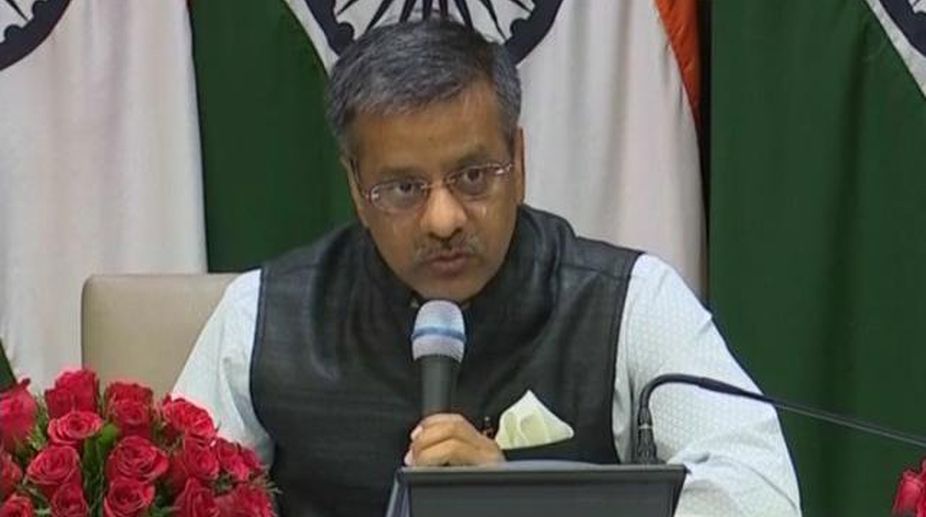Fact-check: Viral video of nurses protecting babies is from China, not Bangkok
Amidst this, a video of nurses protecting newborns during an earthquake originally from China province, is being incorrectly shared as a recent incident from Bangkok.

External Affairs Ministry spokesperson Gopal Baglay (TWITTER)
India on Saturday refused to be a part of China's One Belt One Road (OBOR) initiative citing its objections to the $46 billion China-Pakistan Economic Corridor, that passes through Pakistan-administered Kashmir.
Citing the CPEC that is being touted as a flagship part of OBOR, External Affairs Ministry spokesperson Gopal Baglay said: "No country can accept a project that ignores its core concerns on sovereignty and territorial integrity."
Advertisement
In a statement, a day ahead of the launch of the two-day summit in Beijing, he said: "Guided by our principled position in the matter, we have been urging China to engage in a meaningful dialogue on its connectivity initiative, 'One Belt, One Road' which was later renamed as ‘Belt and Road Initiative'.
Advertisement
"We are awaiting a positive response from the Chinese side.
"Regarding the so-called 'China-Pakistan Economic Corridor', which is being projected as the flagship project of the BRI/OBOR, the international community is well aware of India's position. No country can accept a project that ignores its core concerns on sovereignty and territorial integrity."
China is organising the two-day Belt and Road conference in Beijing starting Sunday which will be attended by 29 Heads of State including Russian President Vladimir Putin and a US delegation, and see the participation of over 100 countries.
India's non-participation comes as the top leadership of Pakistan, Sri Lanka, Maldives and Myanmar are attending, while Bangladesh and Nepal are sending high-level delegations. Bhutan is not attending.
On Friday, Nepal officially inked a deal with China on OBOR for development of cross-border connectivity.
The $46-billion CPEC is part of OBOR, Chinese President Xi Jinping's signature foreign policy initiative.
New Delhi firmly opposes this corridor of Beijing's project linking Xinjiang in China and the Gwadar port in Pakistan because it passes through Pakistani-administered Kashmir. India lays claim to the disputed region.
The general view was that India attending the forum might amount to surrendering its claim over the region.
However, Beijing has repeatedly sought to allay New Delhi's fears, saying China will not change its position on the Kashmir dispute between India and Pakistan. Beijing terms the dispute as bilateral.
Citing other problems, Baglay said: "We are of firm belief that connectivity initiatives must be based on universally recognised international norms, good governance, rule of law, openness, transparency and equality.
"Connectivity initiatives must follow principles of financial responsibility to avoid projects that would create unsustainable debt burden for communities; balanced ecological and environmental protection and preservation standards; transparent assessment of project costs; and skill and technology transfer to help long term running and maintenance of the assets created by local communities. Connectivity projects must be pursued in a manner that respects sovereignty and territorial integrity."
Noting India shares the international community's desire for enhanced physical connectivity and believes that it should bring greater economic benefits to all in an equitable and balanced manner," Baglay said it was "working with many countries and international institutions in support of physical and digital connectivity in our own immediate and near neighbourhood".
He said that expansion and strengthening of connectivity was an integral part of India's economic and diplomatic initiatives and referred to New Delhi's Act East policy that focuses on the 10 nations of the Association of Southeast Asian Nations (Asean) and the Trilateral Highway project underway to link India, Myanmar and Thailand.
Baglay said that under New Delhi's Go West strategy, it engaged with Iran on the Chabahar Port and with Iran and other partners in Central Asia on the International North South Transport Corridor. India, Iran, and Afghanistan have signed a trilateral agreement to develop the Chabahar port that will will be vital to link south and central Asia.
He also referred to the Bangladesh, Bhutan, India, Nepal (BBIN) motor transport agreement saying it is an initiative that is aimed at enhancing logistics efficiencies in the South Asian region.
"We are also actively considering acceding to TIR (Transports Internationaux Routiers or International Road Transports) Convention," he said. The TIR Convention establishes an international customs transit system.
Advertisement
Amidst this, a video of nurses protecting newborns during an earthquake originally from China province, is being incorrectly shared as a recent incident from Bangkok.
China and India, as the largest developing nations and key members of the Global South, must collaborate to foster development and contribute to global peace and stability
The party said that the Prime Minister Modi should take the people into confidence on this issue of national importance.
Advertisement
